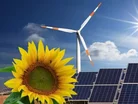France gets green light for 3 renewable energy projects

France has been given the go-ahead to build three new renewable energy projects that will help progress towards its 23 percent of production target.
The European Commission has approved three schemes to support electricity production from small-scale onshore wind, solar and sewage gas installations in France under EU state aid rules. The schemes will allow France to develop more than 17 additional gigawatts in renewable energy.
The onshore wind scheme has a provisional budget of €1 billion per year, the solar scheme has a provisional budget of €190 million per year, and the sewage gas development scheme has a provisional budget of €58 million per year. These measures will help France achieve its 2020 target of producing 23 percent of its energy needs from renewable sources.
The three projects comprise:
- An onshore wind scheme which will grant support to 15 gigawatt of additional capacity over the next ten years, taking the form of a premium on top of the market price (so-called "complement de remunération") to operators of small-scale onshore installations of less than 6 turbines (with an individual limit of 3 megawatts per turbine).
- A solar support scheme for small-scale photovoltaic installations in buildings (below 100 kilowatt). Installations will receive a feed-in tariff over twenty years. The remuneration varies according to the size of the installation and the business model (installations injecting all electricity into the grid or installations consuming part of the generated electricity). France expects to develop 2.1 gigawatt of solar power under this measure.
- A sewage gas support scheme. France estimates that 160 megawatts is the remaining potential of sewage gas installations in France that can be supported, most of which are installations of less than 1 megawatt. While the scheme is open also to larger installations, it is therefore mainly expected to be applied mainly to small installations. Installations of 500 kilowatts or more will receive support in the form of a premium on top of the market price over twenty years. Installations below 500 kilowatts will receive a feed-in tariff over twenty years.
The Commission assessed all three schemes under EU state aid rules, in particular its 2014 Guidelines for energy and environmental state aid, which ensure that the use of public funds is limited and there is no overcompensation. It concluded that the measures will boost the share of electricity produced from renewable energy sources, in line with the environmental objectives of the EU, while the distortion of competition caused by the state support is minimised.



